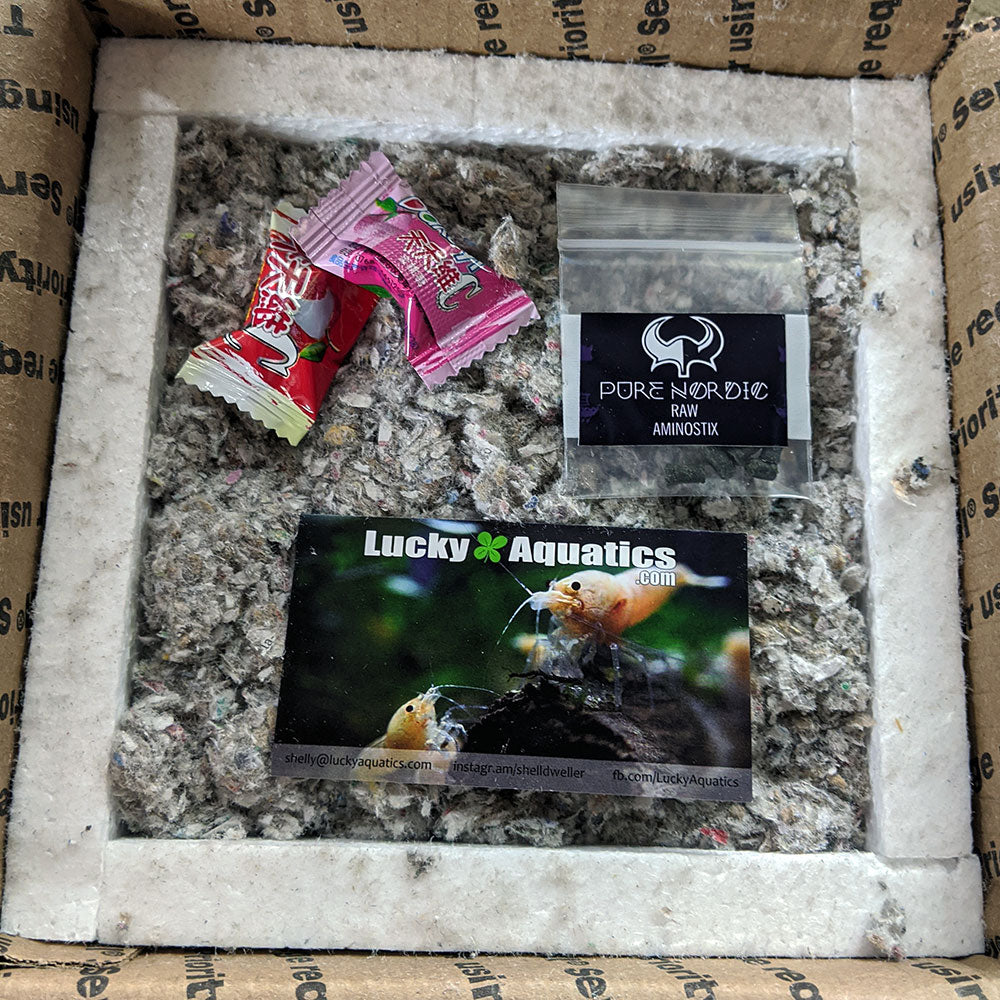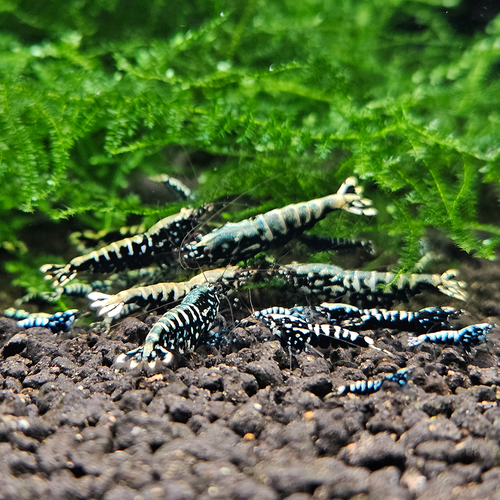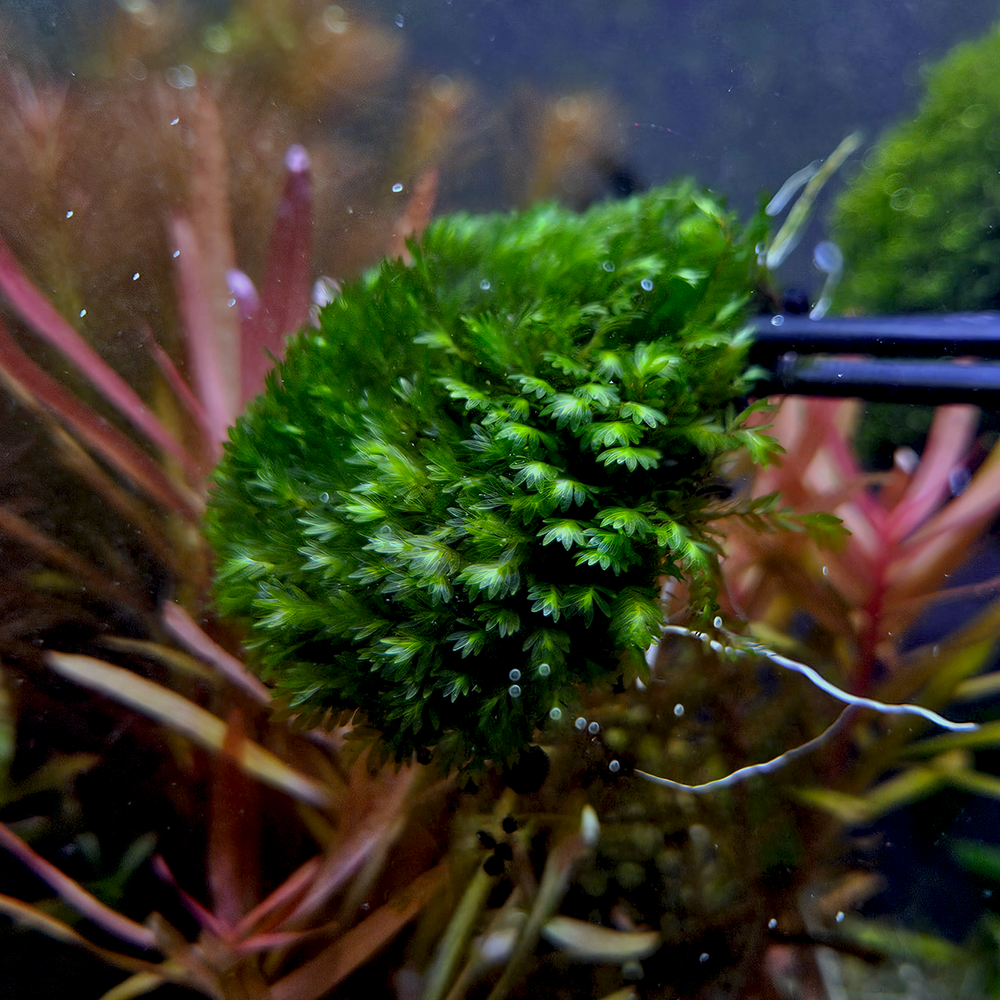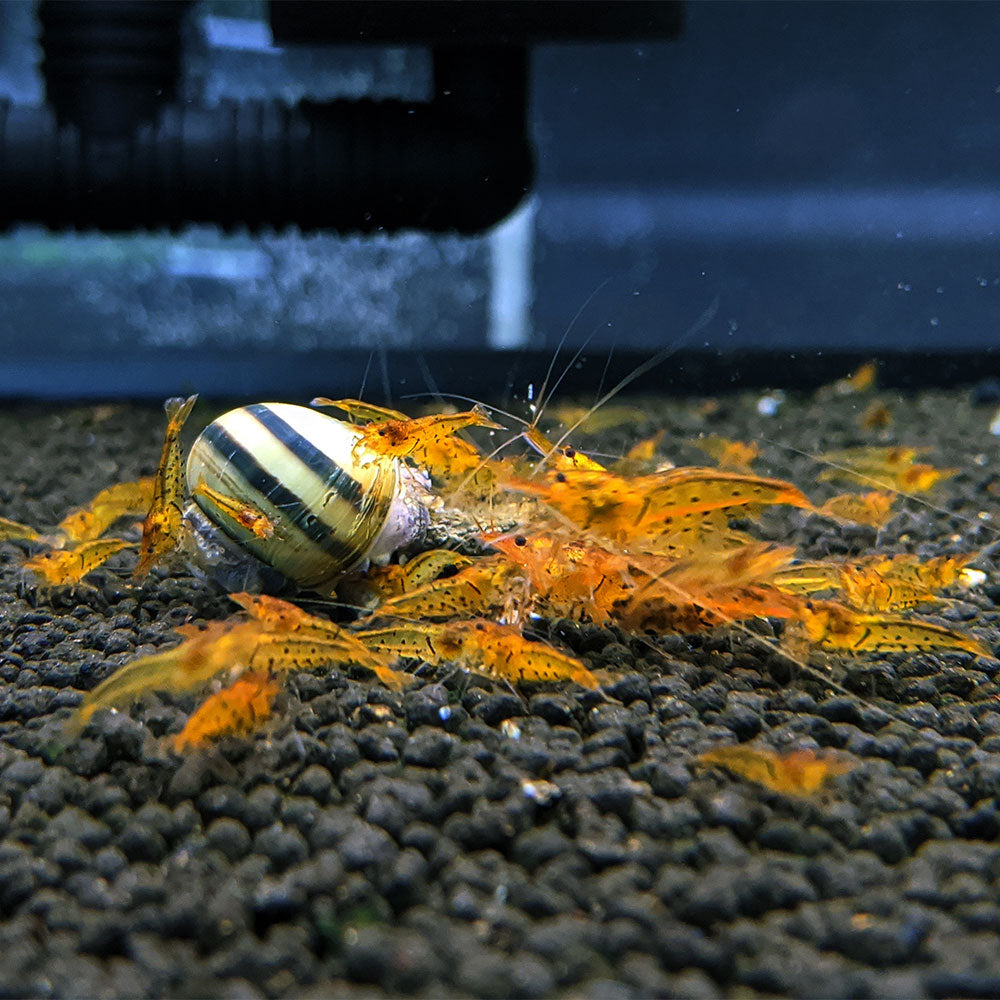I hear this all the time. Is it safe to ship shrimp? Why yes, yes it is, as long as the shipper can check off all of these very important boxes. Some may consider my style of shipping "overboard", but I couldn't disagree more with that. While it may SEEM like overkill, with two kinds of insulation, special bags, and taping the absolute crap out of the box, I can assure you...there are reasons to my madness. This is how I ship all the shrimp I sell on Lucky Aquatics.
Check Box number 1

One of the most important aspects of receiving healthy shrimp through the mail, is to start off with the right stock. Shipping young and happy shrimp is your best bet for a successful shrimpment. I always advocate for buying from home-breeders, mainly because these are hobbyists that are caring for their shrimp as best as they can. Also, because when they're home bred, that means this is their FIRST experience traveling. When you buy imported shrimp, they have already been shipped halfway around the world, and if the importers don't do a "rest" period, or quarantine (Oh that word sends chills down my spine halfway through 2020), these shrimp will be once again thrown in a box and shipped potentially across the country. Hardly seems relaxing.
Check Box number 2

How the shrimp are packed, and what kind of bags are used. I always use breather bags, add Seachem Purigen and a bit of moss or live (healthy) plant, and heat seal BOTH ends with my own heat sealer. Breather bags are a great way to ship your shrimp because you can pack these with NO AIR. The bags themselves exchange O2 and CO2, so the shrimp can breathe, and without packing air in there, splashing around is reduced considerably. Packing with Purigen is kind of a safe guard in case things happen. If for some reason, a shrimp dies in transit, the Purigen will help remove the ammonia and other toxins from the water, safeguarding the other shrimp. Purigen also benefits the shrimp in case of delay in shipping, which lets face it, has been happening a lot lately with Covid-19 delays. I always add moss or a plant for the shrimp to have something to grab on to while in transit. Finally, I use my own heat sealer, because when I depended on their seals, their seal would burst. Not conducive to a successful shipment.
Check Box number 3

Packing your box for shipment. First things first, I use rigid insulation to create a solid foam box to pack the shrimp in. Hard to explain in text, so check out the image. This helps keep the box intact when experiencing minor crushes, because some times they set other (heavier) boxes on top, or drop the box. This also adds a layer of insulation, helping to keep the temperature steady, allowing it to experience extreme temperatures for just a little longer (which can end up making all the difference). Honestly, any time I have received shrimp in the mail without this rigid insulation, the box has been damaged. I don't like to take that risk with my shrimp. Inside, we use soft, blow in insulation (not fiberglass) to hold the shrimp in place inside the box. You can't have your bag of shrimp just chillin in the box, banging around every time the carrier takes a different turn. This soft insulation, packed in well, will create a pillow for your bag of shrimp, to soften any drops and bangs the box may experience in transit.

Check Box number 4

Tape the ever living crap out of that box. I usually use 3 strips of tape for each end, and I use the STICKIEST tape that I can find. Sure, one strip of tape is *usually* just fine, but why cheap out here? I want to make sure all my shrimp make it to their destination. I don't want shrimp dying because of some small area of neglect in the packing process. Taping the box up well, will also keep it from breaking and falling apart if it does get beat up in transit.
Check Box number 5
Just use Priority Shipping. Priority shipping is typically 2-3 days in transit. First Class is usually 2-3 days transit, so why not safe a few dollars and ship it First Class? Because just as soon as you rely on First Class to get there on time, it wont. Priority is just that--their priority. So when they get backed up, or are understaffed *ahem*covid*, they will prioritize Priority mail first, and First Class gets put on the next truck (which could take days). I have had First Class mail sit at a check point for a few days because of delays in the area. Delays can be caused by weather as well, so you can never really know when to expect delays.
Check Box number 6

Check the weather before shipping. If the receiver of the shrimp does not have a post office box, or wont be home to take delivery (we don't want the box to sit outside in the extreme hot or cold), send your shrimp with the "Hold for Pick Up" option selected. This way, instead of delivering to the house, they will hold the package inside the post office, so the receiver is able to pick up the shrimp at their convenience, and the shrimp are kept safe in a climate controlled building.
So yea, there you have it. Its actually pretty simple, as long as you have the right materials. Whether you want to ship some shrimp yourself, or you are worried about purchasing live shrimp from an online source, if they can check off all 6 of these boxes, you should have no problem sending/receiving shrimp via USPS.
Check Box number 1

One of the most important aspects of receiving healthy shrimp through the mail, is to start off with the right stock. Shipping young and happy shrimp is your best bet for a successful shrimpment. I always advocate for buying from home-breeders, mainly because these are hobbyists that are caring for their shrimp as best as they can. Also, because when they're home bred, that means this is their FIRST experience traveling. When you buy imported shrimp, they have already been shipped halfway around the world, and if the importers don't do a "rest" period, or quarantine (Oh that word sends chills down my spine halfway through 2020), these shrimp will be once again thrown in a box and shipped potentially across the country. Hardly seems relaxing.
Check Box number 2

How the shrimp are packed, and what kind of bags are used. I always use breather bags, add Seachem Purigen and a bit of moss or live (healthy) plant, and heat seal BOTH ends with my own heat sealer. Breather bags are a great way to ship your shrimp because you can pack these with NO AIR. The bags themselves exchange O2 and CO2, so the shrimp can breathe, and without packing air in there, splashing around is reduced considerably. Packing with Purigen is kind of a safe guard in case things happen. If for some reason, a shrimp dies in transit, the Purigen will help remove the ammonia and other toxins from the water, safeguarding the other shrimp. Purigen also benefits the shrimp in case of delay in shipping, which lets face it, has been happening a lot lately with Covid-19 delays. I always add moss or a plant for the shrimp to have something to grab on to while in transit. Finally, I use my own heat sealer, because when I depended on their seals, their seal would burst. Not conducive to a successful shipment.
Check Box number 3

Packing your box for shipment. First things first, I use rigid insulation to create a solid foam box to pack the shrimp in. Hard to explain in text, so check out the image. This helps keep the box intact when experiencing minor crushes, because some times they set other (heavier) boxes on top, or drop the box. This also adds a layer of insulation, helping to keep the temperature steady, allowing it to experience extreme temperatures for just a little longer (which can end up making all the difference). Honestly, any time I have received shrimp in the mail without this rigid insulation, the box has been damaged. I don't like to take that risk with my shrimp. Inside, we use soft, blow in insulation (not fiberglass) to hold the shrimp in place inside the box. You can't have your bag of shrimp just chillin in the box, banging around every time the carrier takes a different turn. This soft insulation, packed in well, will create a pillow for your bag of shrimp, to soften any drops and bangs the box may experience in transit.

Check Box number 4

Tape the ever living crap out of that box. I usually use 3 strips of tape for each end, and I use the STICKIEST tape that I can find. Sure, one strip of tape is *usually* just fine, but why cheap out here? I want to make sure all my shrimp make it to their destination. I don't want shrimp dying because of some small area of neglect in the packing process. Taping the box up well, will also keep it from breaking and falling apart if it does get beat up in transit.
Check Box number 5
Just use Priority Shipping. Priority shipping is typically 2-3 days in transit. First Class is usually 2-3 days transit, so why not safe a few dollars and ship it First Class? Because just as soon as you rely on First Class to get there on time, it wont. Priority is just that--their priority. So when they get backed up, or are understaffed *ahem*covid*, they will prioritize Priority mail first, and First Class gets put on the next truck (which could take days). I have had First Class mail sit at a check point for a few days because of delays in the area. Delays can be caused by weather as well, so you can never really know when to expect delays.
Check Box number 6

Check the weather before shipping. If the receiver of the shrimp does not have a post office box, or wont be home to take delivery (we don't want the box to sit outside in the extreme hot or cold), send your shrimp with the "Hold for Pick Up" option selected. This way, instead of delivering to the house, they will hold the package inside the post office, so the receiver is able to pick up the shrimp at their convenience, and the shrimp are kept safe in a climate controlled building.
So yea, there you have it. Its actually pretty simple, as long as you have the right materials. Whether you want to ship some shrimp yourself, or you are worried about purchasing live shrimp from an online source, if they can check off all 6 of these boxes, you should have no problem sending/receiving shrimp via USPS.




